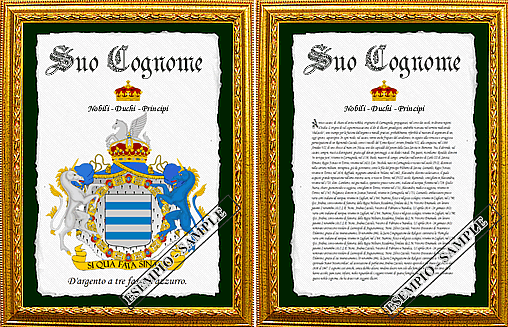You may be interested
Cossetti, very rare, has a small stock in the Brescia area, one in Friuli and one in the Piceno, Cossetto, extremely rare, has a stock in Turin and one in Trieste. hypothesis reached by Gabriele Cossetti In all probability the surnames: COSS, COSSA, COSSALI, COSSALTER, COSSANDI, COSSAR, COSSARA, COSSARI, COSSARINI, COSSARIZZA, COSSARO, COSSART, COSSATO, COSSAVELLA, COSSE ', COSSEDDU, COSSELLI, COSSELLU, COSSENTINO, COSSER, COSSERAT, COSSETA, COSSETTO, COSSETTI, COSSIA, COSSIANI, COSSIAU, COSSICH, COSSIDENTE, COSSIERS, COSSIGA, COSSIGNANI, COSSINA, COSSINNI, COSSINANI, COSSINI, COSSIRA, COSSIRI, COSSIRA, COSSIRA, COSSIRI, COSSOLINI, THUS, COSSON, COSSON, COSSOTTO, COSSOVEL, COSSOVICH, COSSU, COSSUTTO, COSSUTTA, COSSUTTI, COSSUZIO, etc. as well as the names of localities: COSSAINE (SS), COSSANO BELBO (CN), COSSANO CANAVESE (TO), COSSATO (VC), COSSERIA (SV), COSSIGNANO (AP), COSSOGNO (NO), COSSOMBRATO (AT), COSSU (NU), etc. they are related to the ancient Roman name of COSSUS, people belonging to one of the sixteen oldest rustic tribes, namely that of CORNELI (name of ethnic origin which means of CORNE 'hill in the Agro Tusculano). The oldest branch is that of the MALUGINENSES, from which the families of the COSSI and ARVINA, and therefore that of the SCIPIONES, separated. The typical nickname of COSSI is RUTILUS (red, tawny, bright, shining) perhaps in relation to the physical characteristic of red cheeks or other blushes, as in relation to physical characteristics is the name COSSUS: 'woodworm' of probable origin Etruscan "Ab antiquis dicebantur natura rugosi corporis homines, a simile vermium ligno editorum, qui cossi appellantur" -Festo, 36-II. In "THE STORIES" of TITO LIVIO are mentioned: AULO CORNELIUS COSSUS - It reports the Excellent remains in 428 BC of Larte Tolumnio king of the Veienti - Pontifex Maximus in 431 BC - Consul in 428 BC - Military tribune with consular power in 426 BC - Governor in Rome between 426 and 413 BC - Master of Cavalry between 426 and 413 BC - Consul in 413 BC GNEO CORNELIUS COSSUS - Military tribunal with consular power in 414 BC - Consul in 409 BC - Military tribune with consular power in 406 BC - Governor in Rome in 405 BC - Military tribune with consular power in 404 and 401 BC PUBLIO CORNELIUS COSSUS - Military tribune with consular power in 408 BC - Dictator in 407 BC - Military tribune with consular power in 406,395,394aC CORNELIUS COSSUS HALL - Dictator in 385 BC - He arrested Marco Manlio Capitolino - He celebrated the triumph over the Volsci and abdicates. CORNELIUS HALL ARVINA COSSUS - Master of the Cavalry in 353 and 349 BC - Consul in 343 BC - Leads an army in the Sannio and is saved from defeat by DECIO MURE - Consul in 333 and 332 BC - Dictator in 322 BC, triumphs over the Samnites. The centuriazioni (assignment to the veterans of the territories expropriated to the vanquished) must have dispersed these Roman people in the richest areas such as ROMAGNA (Roman area), France, Spain and Romania. In these areas the differentiations from the ancient surname must have occurred under the influence of dialectal forms. The COSSETTI of central Italy are notaries and soldiers of fortune who came to the south perhaps at the same time as the communities of Bolognola or Villanova di Accumoli. BOLOGNOLA: corresponds to small Bologna, as founded by Ghibellines driven from Bologna between the thirteenth and fourteenth centuries (1274 ad in Historie di Pompeo Vizani). But there are other centers that can recall this origin as Villanova sopra Accumoli (RI) and Villanova di Castenaso (BO). COSSETTI can be derived from COSSUS with the addition of ethnic or toponyms such as -attus (cossattus), -etum (cossetum), -ittus (cossittus), -ottus (cossottus) ancient pet name suffixes used to indicate the name of precise inhabitants locations. bibliography: DICTIONARY OF ETHNICIANS AND ITALIAN TOPONYMS PATRON EDITORE - CAPPELLO BOLOGNA and TRAVAGLINI FESTO POMPEO - clossographer originally from Narbonne, he wrote the epitome of 20 books in the work of VERRIO FLACCO "De Verborum Significatu". (Period 2nd or 3rd century AD)
Buy a heraldic document with your coat of arms
It is possible to do a preliminary research in our archive. About 100,000 heraldic traces, origins of surnames, coat of arms and blazons are available free of charge. Just write the desired last name in the form below and press enter.
Verba Volant, Scripta Manent
